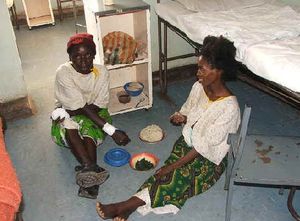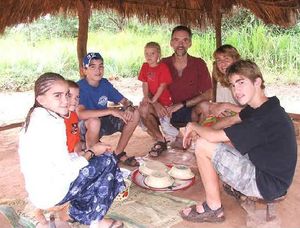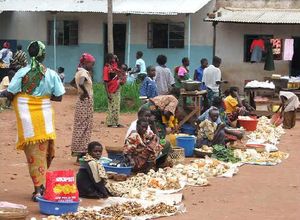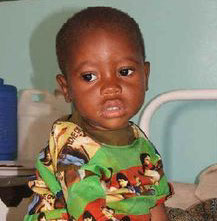Mukinge, Zambia
2006 - 2007
Excerpts from a letter to World Medical Missions:
In the Fall of 2006, I took my family of seven to serve the Lord by serving others at Mukinge, a rural hospital in central Zambia . On November 28th of 2006, we embarked on a journey that would change each of our lives, learning about giving of ourselves in a land where needs are unending and overwhelming, and of trusting a God known as Jehovah Jirah, our provider. We count it a privilege to be in a practice that allows the accrual of 3 months sabbatical time every 4 years, and this opportunity to work in a small mission hospital turned out to be a wonderful gift to our family as we were blessed as much as we gave to the ones we served.
We flew from Buffalo to London, then on to Lusaka, the capital of Zambia, over the course of two days, and remarkably this was fairly uneventful and even pleasant. Our family enjoyed the close time together during this first part of our trip, playing many card games on the floor of the airport waiting for connections, catching catnaps when we could and having God sightings along the way as each leg of our journey continued to transition smoothly.




After spending a couple days in Lusaka finalizing the paperwork for my medical license and having my wife shop for groceries to help supply us with things unobtainable at our final destination (no small feat for a family of seven!), we took one last flight on two separate Cessna planes to get to the hospital and settle our family in. The house we were given in Mukinge was more than adequate, though quite simple and plain being made of concrete blocks. We had all the basic conveniences like a kitchen with a stove, and even a microwave, a bathroom, and bedrooms. But compared to our belongings in the States, it was quite a change, having to adjust to drinking water only out of a filter that had to be kept full, cooking only on the electric stove since cooking gas was absent in the country, dealing with oversized insects everywhere, managing with frequent electrical outages, sleeping under mosquito nets, taking daily medicines to prevent malaria, and many more changes. I was quite proud of our family though, who rose to the occasion and adjusted very well.
I found medicine in this third world country very challenging. HIV is rampant with up to 40% of the population suspected as being infected, which leads to many premature deaths and a significant number of orphans in the country. But I was pleased that the money that President Bush has sent to Africa is being put to good use, with many programs initiated and in full swing, actually making a difference in people’s lives. Tuberculosis, STDs, and many tropical diseases were frequent diagnostic challenges, but it was harder to get used to having few choices of medication with which to treat. Malaria was as frequent as the common cold and it never ceased to amaze me the incredible ability of the human body to survive against tremendous odds.
But death was an ever-present reality, and these people were intimately acquainted with grief and loss. It was a hallowed experience to witness the haunting wails of a mother at the death of her beloved child. These mourning wails echoed frequently in the halls of the hospital compound, reminding us all of the reality of our mortality. Chaplains were very busy in the midst of this loss bringing hope through the sharing of their faith, and it was freeing to be able to openly and readily pray with the patients I was privileged to manage. I often found myself counting the blessings we have from living in a country full of comparatively unending resources, yet other times feeling almost a sense of guilt for the same reason, letting the inequity of this reality settle in to varying degrees.
The most challenging thing for me was dealing with the cultural difference of time management. There is a saying that goes, “Americans have watches, but Africans have time.” This was true in Kenya where we spent our previous sabbatical in 1998 and was just as true in Zambia . People come first in their minds, as evidenced by the greeting process itself. When passing someone, there was always a warm head nod or gentle bow at the knee with a hand clap while expressing the “mwane” greeting. If the person was more known, then stopping for a ritual handshake and inquiring of the well-being of the family members was in order. Unfortunately, to a time-oriented person, this would initially become quite frustrating as in the hospital things needed to get done, but wouldn’t with all these greetings. It was a tender spiritual lesson for me to begin to learn, and is a struggle to remember, this focus on relationships over accomplishments.
I also recall a cultural issue which was described to us in our orientation, and we had experienced to some degree in Kenya -that of begging. Several times a week people would knock hopefully at our door requesting goods or food or money. This readily tugged at our heart strings making it hard to turn them away, but the recommendations were to avoid randomly giving out money so as not to encourage such dependency. More disappointing, though, were people who would come and get to know you only to eventually request a gift of money to help their plight. I recall one specific couple who stopped by our home for a cup of tea. As we readily brought them in to share an afternoon of discussion, I thought it would be encouraging to get to know another Zambian couple more intimately. But then came the request for their adopted daughter’s school fees. With the disappointment this brought, my wife brought to mind that this is probably how God often feels with us, desiring an intimate relationship from us, but receiving more often multiple requests for more things! How true I realized this was after a review of my recent prayer life.
It was a challenge that brought lessons for both me and my family spiritually and practically. It brings a sense of appreciation for many of the little things we so easily take for granted, and increases our dependence upon a God who promises to be faithful and provide. And hopefully, these lessons learned will carry on into my practice and my life for years to come.
By Timothy M. Kitchen, MD, FAAFP
